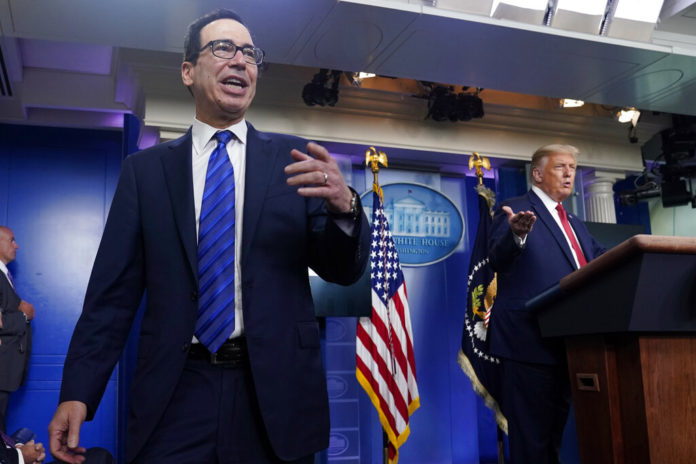
Americans counting on emergency coronavirus aid from Washington may have to wait until fall.
Negotiations over a new virus relief package have all but ended, with the White House and congressional leaders far apart on the size, scope, and approach for shoring up households, re-opening schools, and launching a national strategy to contain the virus.
President Donald Trump’s top negotiator, Treasury Secretary Steven Mnuchin, tried to revive stalled talks Wednesday, but House Speaker Nancy Pelosi and Senate Democratic leader Chuck Schumer dismissed the “overture,” saying the Trump administration is still refusing to meet them halfway. Congressional Republicans are largely sitting out the talks.
“The White House is not budging,” Pelosi and Schumer said in a joint statement.
With the House and Senate essentially closed, and lawmakers on call to return with 24-hours notice, hopes for a swift compromise have dwindled. Instead, the politics of blame have taken hold, as the parties head into August focused on the presidential nominating conventions and lawmakers’ own reelection campaigns.
Trump said the Democrats are “holding the American people hostage.”
All indications are talks will not resume in full until Congress resumes in September, despite the mounting death toll, surpassing 161,000 in the U.S., and more than 5 million people infected.
For Americans, that means the end of a $600 weekly unemployment benefit that has expired, as has a federal ban on evictions. Schools hoping for cash from the federal government to help provide safety measures are left empty handed. States and cities staring down red ink with the shattered economy have few options.
Trump’s executive actions appeared to provide a temporary reprieve, offering $300 in jobless benefits and some other aid. But it could take weeks for those programs to ramp up, and the help is far slimmer than what Congress was considering. More than 20 million Americans risk evictions, and more are out of work.
Mnuchin and White House chief of staff Mark Meadows briefed GOP senators privately on Wednesday. But congressional Republicans, who have left the negotiating largely to Democrats, seem satisfied there is enough money still available from previous aid packages, for now.
Senate Majority Leader Mitch McConnell put in motion the procedural steps to recess, possibly Thursday. The House is already gone.
Because McConnell has such cool support from his ranks for any bill, Democrats are trying to push the White House to go bold. They want to maintain the $600 jobless benefit and provide nearly $1 trillion to the states and cities, nonstarters for the White House.
While there is some common ground over $100 billion for schools and new funds for virus testing, Democrats also want other emergency funds that Trump rejects, including to shore up the U.S. Postal Service and election security ahead of the November election.
“Democrats have compromised,” Pelosi and Schumer said, noting that they dropped their initial $3 trillion-plus proposal by $1 trillion and expect Trump’s team to raise its $1 trillion offer by a similar amount to $2 trillion. “However, it is clear that the Administration still does not grasp the magnitude of the problems that American families are facing.”
Their joint statement said Mnuchin made an “overture” to meet. The treasury secretary called the Democratic leaders on Wednesday, according to a person granted anonymity to discuss the private call.
The Democrats said they are waiting for the White House to put a new offer on the table. “We have again made clear to the Administration that we are willing to resume negotiations once they start to take this process seriously.”
But Mnuchin shot back with his own statement, saying, “The Democrats have no interest in negotiating.”
Mnuchin said Pelosi’s statement was “not an accurate reflection of our conversation. She made clear that she was unwilling to meet to continue negotiations unless we agreed in advance to her proposal, costing at least $2 trillion.”
McConnell said the American people need help and “are not done fighting this virus.”
Republished with the permission of the Associated Press.














